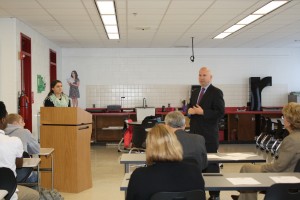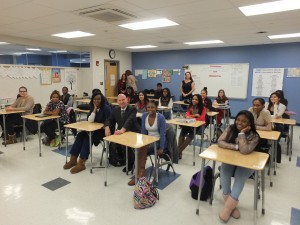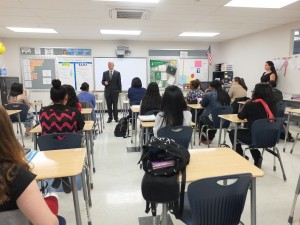Delaware schools greatly expanding opportunities to earn college credit
Dover, DE – Building on efforts to ensure all Delaware students graduate prepared to continue their education or start a career, the Governor announced today that the number of high school students taking college-level classes before graduation is dramatically increasing for the second consecutive year. Across the state, 28 high schools have offered classes with a combined attendance of more than 2,100 students during the fall semester. That represents an increase of about 400 from last fall, when 25 high schools offered 100 classes with a combined attendance of just over 1,700 students. By the end of this academic year, total attendance will surpass 2,700 in 170 dual enrollment courses. The number of classes and participants has tripled in the past two years since Governor Markell announced an initiative to increase these opportunities in his 2014 State of the State address.
A full breakdown by individual districts and schools will be released by the Department of Education next month.
“Our goal is to make dual enrollment available for every student in Delaware who wants to participate, and together, we are making that more of a reality every year,” said Governor Markell. “Students who take college courses in high school are more likely to attend and persist in college and to graduate ready for their next step, so we are eager to continue our progress in years to come.”
Through these dual enrollment courses, students receive instruction either on a college campus or from a teacher who has received special accreditation from one of the state’s higher education institutions. Credit can count toward high school graduation and a college degree. Dual enrollment is different from Advanced Placement courses, which prepare students for an exam, through which they can earn college credit if they receive a high enough score. Participation in AP classes has also steadily increased, including by more than 400 in the past couple of years.
According to the U.S. Department of Education, students who complete college credit while in high school require less remediation, have higher Grade Point Averages, and earn more credits in college.
“This progress is only possible because of an intense effort by educators and administrators to prepare to offer these classes, as well as by our colleges and universities,” said Education Secretary Steve Godowsky, who recognized the University of Delaware, Delaware State University, Delaware Tech, Goldey-Beacom, Widener and Wilmington University for working with districts. “At a time when education and training beyond high school is more important than ever for students to reach their potential, our state needs a strong partnership between our districts and our higher education community. Their collaboration on these courses showcases the best of what that can mean for our young people.”
Markell highlighted the state’s progress today at POLYTECH High School, one of the schools that has made the most progress in making more college-level courses available across a variety of subjects, ranging from anatomy to sociology. In addition, partnerships with Delaware Technical & Community College and Wilmington University have allowed the school to explore opportunities for students to take dual enrollment courses in nine Career Technical Education areas, including electrical construction. Overall, attendance in dual enrollment at POLYTECH doubled from about 130 to about 260 in just the past year. The Governor visited with students taking electrical construction, early childhood instruction, psychology, history, and personal wellness.
“Almost all median income jobs now require post high school coursework or certification,” said POLYTECH Principal Jason Peel. “Our students will be able to work right after high school as well as have an advanced start to earning a college degree. I am so proud of our teachers for seeking out these opportunities for their students.”
In his 2014 State of the State address, Markell announced an initiative to ensure all high school seniors have access to a college-level class, regardless of their financial circumstances. The state has funded hundreds of students each year as part of this effort.
The Department of Education has worked with districts to identify college-ready students who would benefit from taking a dual enrollment course through one of the state’s higher education institutions. Students can then enroll in college having accumulated credits without any financial burden, thus making college more affordable and increasing the likelihood they will graduate on time.
The dual-enrollment increase complements a partnership that the state has launched with the College Board to send all college-ready seniors application and financial aid resources, including application fee waivers to eligible students. Students then receive help in school filling out their applications and financial aid forms. For the past two years, every college-ready senior has applied to college and nearly all enrolled. Previously, as many as one out of five had not.
###

